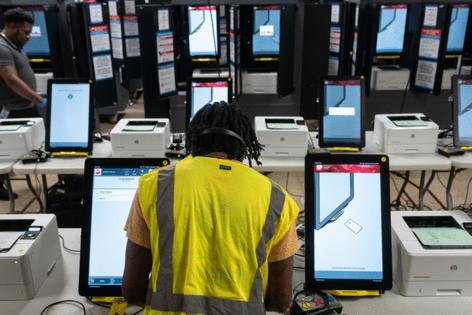Judge dismisses election security case but voices 'concerns' about Georgia's voting computers
Published in News & Features
ATLANTA — A federal judge has dismissed an epic court case challenging Georgia’s touchscreen voting system, ending the seven-year lawsuit that uncovered election security vulnerabilities and a breach in Coffee County.
U.S. District Judge Amy Totenberg closed the case Monday but cited “substantial concerns” about Georgia’s voting technology, which uses touchscreens to print paper ballots.
The case was a major legal test of Georgia’s voting technology, manufactured by Dominion Voting Systems and installed months before the 2020 election. The lawsuit alleged that the voting technology is dangerously vulnerable to tampering, hacks or programming errors that could change the outcome of an election.
Secretary of State Brad Raffensperger, the defendant in the case, said the ruling is a “resounding vindication” of Georgia’s elections.
“All the real-world evidence shows that Georgia’s paper ballot system works well,” Raffensperger said. “The voters of this state know that their votes are counted securely, accurately and quickly.”
One of the plaintiffs, Marilyn Marks of the election security organization Coalition for Good Governance, said Georgia’s voting system is “insecure and unsuitable for use in public elections.”
“While we consider our next legal steps, one thing is clear: the Georgia Legislature must act now,” Marks said. “Georgia must move to adopt hand-marked paper ballots for the 2025 and 2026 elections to protect the integrity of our elections and restore public confidence.”
While ruling against the plaintiffs, Totenberg wrote in her decision that their advocacy “helped spark real legislative change,” such as a state law passed last year that would eliminate computer-readable QR codes from ballots by July 1, 2026. The plaintiffs included both liberal and conservative voters, as well as the Coalition for Good Governance.
Totenberg’s dismissal order arrived during the final week of this year’s legislative session, and lawmakers haven’t budgeted money to pay for the estimated $66 million cost of removing QR codes.
“If these legislative measures are ultimately funded and implemented, they are the type of timely legislative action that can bolster public confidence in the management and security of Georgia’s voting system,” Totenberg wrote in her 33-page ruling.
President Donald Trump also opposed QR codes as part of his executive order last week, calling for them to be banned nationwide.
Totenberg, an appointee of former President Barack Obama, did not decide on the merits of the case when she ruled against the plaintiffs. Instead, she dismissed the case because they failed to show they suffered an injury that would entitle them to intervention or relief from the U.S. courts.
There’s no evidence that voting machines have ever been hacked during an election, but Republicans skeptical of Georgia’s voting system often refer to the case to support their unproven suspicions about Trump’s narrow loss in the 2020 election.
The plaintiffs told the judge during a 17-day trial last year that the risk is real. State election officials countered that the voting system is safe and secure.
During the trial, an expert showed how Georgia’s voting machines could be hacked — a scenario that election officials said was unrealistic in the real world.
University of Michigan computer science professor Alex Halderman demonstrated in court that he could use a USB device or a pen to gain “superuser” access to voting machines, allowing it to change its code and potentially flip votes. Witnesses for the secretary of state’s office said security protocols would prevent that from happening.
As a result of Halderman’s research, the U.S. Cybersecurity and Infrastructure Security Agency issued an advisory backing up his research of vulnerabilities.
The plaintiffs in the case also revealed the election intrusion in Coffee County in January 2021, when tech experts hired by allies of Trump copied the state’s voting software. The plaintiffs said access to the software could allow bad actors to create malware that they could install on voting machines.
David Cross, an attorney for the plaintiffs, said the ruling leaves voters unable to know that their ballots are counted correctly.
“The right to vote must logically include the right to know what’s recorded on one’s vote on the ballot. Otherwise, the right to vote is illusory,” said Cross, who represented several voters in the lawsuit.
When the lawsuit was filed in 2017, it challenged Georgia’s all-electronic voting system and later evolved into claims against the state’s replacement touchscreen system.
Georgia purchased its statewide Dominion voting system, which combines touchscreens and printers to produce a paper ballot, for $107 million in 2020.
The ballot displays voters’ choices in human-readable text alongside a QR code that is read and counted by scanning machines. The electronic count is the official count, but the paper ballot is used during hand-counted election audits.
Instead of funding the removal of QR codes, legislators are considering a bill that would eventually replace Georgia’s touchscreens with paper ballots filled out by hand instead of by machine.
Hand-marked paper ballots were also the primary goal of the plaintiffs, who said they would help prevent the possibility of tampering that could change the results.
Totenberg previously required Georgia to replace its “unreliable and grossly outdated” voting system.
In 2019, she prohibited further use of Georgia’s 20-year-old electronic voting machines, which didn’t print a paper ballot. The Georgia General Assembly had already passed a law earlier that year to install the touchscreen voting computers.
This time, Totenberg decided she lacked the authority to move forward with the case. Ultimately, state legislators will be responsible for deciding how Georgians cast their votes.
“The individual plaintiffs have not shown that their alleged ‘injuries’ implicate legally protected interests — rather than mere policy disagreements,” Totenberg wrote.
©2025 The Atlanta Journal-Constitution. Visit at ajc.com. Distributed by Tribune Content Agency, LLC.







Comments